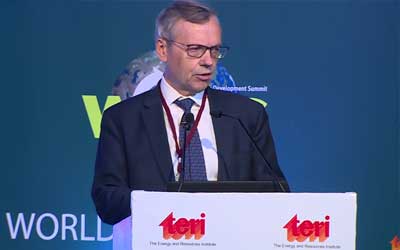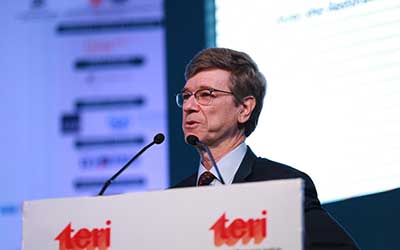
Amid Increasing Global Cooperation, The World Looks to India’s Sustainability Game Plan
 Asia, the centre of the sustainable world
Asia, the centre of the sustainable world
With participation from over 41 countries, the second annual WSDS 2018 commenced with a call for unparalleled global cooperation towards mutual sustainability goals. While defining the imperatives of global sustainability, Dr Ajay Mathur, Director General, TERI, said “We must move towards a future where the world is better environmentally, economically, and socially”. Joining him on the stage were, HE Nils Ragnar Kamsvag, the Royal Norwegian Ambassador to India; Mr Ashok Chawla, Chairman, TERI; and Prof Jeffrey D Sachs, Director, Earth Institute, Columbia University.
"We have lived off the oceans for generations"
Ambassador Kamsvag recounted the tragic story of the ‘Plastic Whale’ as a call to action for global cooperation. “A small beached whale was found dead on the coast of Norway, its stomach filled with 30 plastic bags. The images of the ‘whale led to thousands of volunteers cleaning up our beaches and fjords.”
“This garbage travelled the seas for a long time,” he noted, because the plastic bags had English writing on them as opposed to Norwegian. “We need international cooperation to make a difference.” With this spirit, Norway is today undertaking large-scale international ocean sustainability initiatives, taking on waterborne garbage in South East Asia, which has the most acute problems, he added.
Asia, the sustainability centre of the world
In his Keynote Address, Prof Jeffrey David Sachs, delivered a hard-hitting discourse on the stakes at hand. Urging the world to act at a speed “that is completely uncharacteristic of our societies”, he defined the global imperatives that will define sustainability in the 21st century.
“For the future of the world – China and India have to get it right,” he said, summing the world’s global shift of economic strength to Asia, and its need to ensure that its growth was sustainable.
Quickly pulling up a list of “environmental catastrophes” to remind the audience of their role, he said: “Many catastrophes are underway—ocean pollution and acidification, air pollution. We are hitting catastrophe in so many environmental dimensions we can barely keep track. In India – you’re reaching 50° C. These are killers, not inconvenience.”
Citing how the US became a “great” country under President Franklin D Roosevelt, who invested heavily in science, technology, and education, Prof Sachs said, “You must also open up your endless frontiers of science and technology”.
Prof Sachs, in his presentation, underscored a five-point way forward where India could direct its capabilities:
Decarbonization
To achieve the Paris Climate goals, India must exit the “fossil fuel game” by 2050, and its transition from 85% fossil fuel-dominated grid to a green grid will be the fastest transformation of energy systems ever attempted. Electric vehicles and renewable energy must replace our coal and oil-based economies.
Trans-border cooperation
Peace is vital to the success of the Paris Climate Agreement. Now, more than ever, stronger relations between neighbours is vital for sustainable development, like between the US and Mexico or India and Pakistan.
Transformative tech
Technology must be directed to find sustainable uses for land, energy, and to allow rural access to education, and delivery of healthcare services
-
Global land use strategy
As seen in the global demand for natural resources, such as food, wood, and palm oil “wrecking” forests in Amazon and Indonesia, land use is no more limited by geography. It, therefore, requires a globally sound land use strategy.
Investment
With trillions spent on wars and no positive outcomes, it is advisable to now channelize funding, to the tune of $ 3–4 trillion per year for sustainable development.

